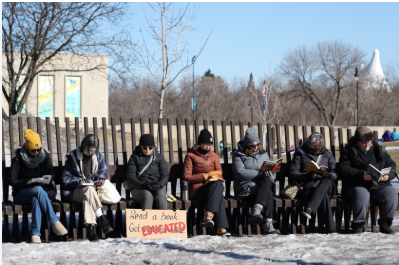COVID-19 affects teens mental health
COVID-19 has had long-reaching negative impacts across the board. One of its most serious consequences is the rapid deterioration in the already problematic mental health of teens. Greater isolation and less assurance about the future are putting extra stress on the already overly stressed. Isolation worsens the ever-growing problems.
I talked to two psychologists, Angela Cavett and Joely Davidson, regarding the impacts of Covid on teens and what can be done to help. Cavett and Davidson work at Chrysalis, a unique clinic that provides counseling for children, adolescents, and adults.
The new structured and encouraged isolation accompanied with Covid has many negative effects. For example, those already struggling with their mental health had their support group stripped away. This isolation has also made it harder on students.
“Many people have that core group, but lots of social interaction with other people is part of the high school experience that is necessary to develop mentally… [students] learn more at lunch than physics or biology. The things in life that matter, you’re going to learn by socializing” said Cavett.
Furthermore, these new Covid rules can increase the number of students who will be left out. Cavett said that she works with kids that can only sit with one other person. If they normally sit in a group of five, then it’s devastating for the one left out.
Unfortunately, many people have been noticing that their self motivation has almost completely disappeared. This too can be linked back to Covid. Davidson said that it could be due to the constant changes within the school’s schedule,“That is so much change for anyone to handle, especially for teenagers. It makes sense why there’s a lack of motivation.”
Cavett added, “We are living through a global trauma. Whenever you have trauma you have difficulty with concentration. Your mind is focused on things that are important: survival.”
Cavett and Davidson said that knowing how the brain works is crucial to understanding this lack of motivation. The brain has a higher part, which includes the cortex, and a lower part. The cortex is used to think, problem-solve, and plan. They used the analogy of a two story house to explain what happens when the brain is going through trauma: when the lower part of the house is on fire (trauma), it disrupts the higher part, making it no longer able to function properly. It creates hyperarousal (an abnormal state of increased responsiveness to stimuli), and more irritability. The person begins to internalize and isolate as a coping skill. The cortex goes offline.
Cavett said “If it [the brain] is not calm or feeling safe, the cortex doesn’t care if you have homework that is past due. Safety is primary. Schools and parents need to understand this. Students may look like they’re being irresponsible, but they may be dysregulated.”
This isn’t an easy fix, but Cavett recommended trying to calm the lower part of the brain by doing things that soothe and make you feel safe and connected. This could include finding pressure points, deep breathing, or a mindfulness meditation.
Unfortunately, the now necessary use of telehealth, the platform used to help clients virtually, has dissuaded those who need help from seeking it.
Cavett said, “I do think people see telehealth as a barrier. People are hesitant to use it because they feel like they won’t be as connected to us. There is a certain percentage of people who wait. People need to be seen when there is that need. If there is any hesitancy we wish that they would try it.”
Cavett herself was initially skeptical of telehealth. She said, “I thought telehealth was not something I’d ever do because I love being with the person. I’ve been super shocked at how effective it can be. Research says that too. Telehealth can be just as effective.”
In some areas, it can be even more effective. For example, it makes it more convenient, teenagers often feel more comfortable from their home, and it provides the option to work with the entire family. However, some aspects can’t be replicated virtually. These include their play space, gardens, and the drumming group to name a few.
Luckily, Cavett and Davidson shared some strategies that anyone can use to help cope with the added anxiety and stress brought on by Covid. First, Cavett recommended strengthening important relationships. Strong relationships can help people feel safe, which will decrease the uncertainty felt about the world. Davidson recommended finding hobbies that you enjoy and trying them out as a way to calm yourself and to bring joy. They also stressed the importance of nature.
Cavett said, “Outdoors is huge! Throughout history many cultures have used nature as part of healing, but then we moved away from it. Now there is a reawakening.”
Cavett expanded on this by saying that nature has so much to teach us, especially due to the many metaphors found within it. For example, Cavett recently planted a bulb upside down. She went back to find the stem had found a way to right itself. In life, we get a situation that is not optimal, but we find ways to persevere. Finally, Cavett strongly encouraged meditation. She said, “At first I thought that this is just trendy, but the more I did it myself, the more I realized it works.” Mediation is a technique where one focuses on the breath so one can become grounded in the present and not worry about the thousands of uncertainties in life.
Research has shown the many long term benefits of regular meditation. Recent brain scans have confirmed that meditation lowers one’s emotional reactivity. The person will still feel emotions, but the emotional response will not be as extreme. This causes the person to have a calmer and more productive response. Cavett then explained the ‘mountain of mindfulness.’ It begins with the breath, then it adds in the senses (sight, sound, touch), then feelings, and finally concepts, such as forgiveness. Cavett then expanded on the importance of meditating with feelings.
She said, “Anger has a lot to teach us. Sadness and depression has a lot to teach us. People never let themselves just be with it. Befriend anger. Become comfortable with it. Know that anger has something to teach you. It’s okay for you to be angry.”
Later Cavett said that after one experiences a crisis or trauma, it’s important to come back to the bottom of the mountain: the breath. Focusing on the breath will put one back into a calm and safe place. If anyone is interested in meditation, but is unsure where to start, Cavett and Davidson recommended Bodhipaksa, Pema Chodron, and Yoga with Adrienne.
COVID-19 has not been easy on anyone. Some of its impacts have been obvious, but others have not. It will probably take years to fully understand the impacts of Covid. However, it’s important to not take the blame for everything, because it could be the cause of situations out of your control. Instead, focus on what is in your control and work on calming the lower part of your brain. Get outside, spend time with family, find a hobby, and meditate are all great things to help relax. School counselors and teachers are also great people to reach out to too if you are in need of anything. Always remember there are others out there to help you, you are not alone.
Your donation will support the student journalists of Fargo North High School. Your contribution will allow us to resume physical printing of our newspaper for students at Fargo North!

Laura Simmons is a writer for Fargo North High's Scroll. She takes Orchestra and Latin as well as Journalism for her electives. She is also active in multiple...


